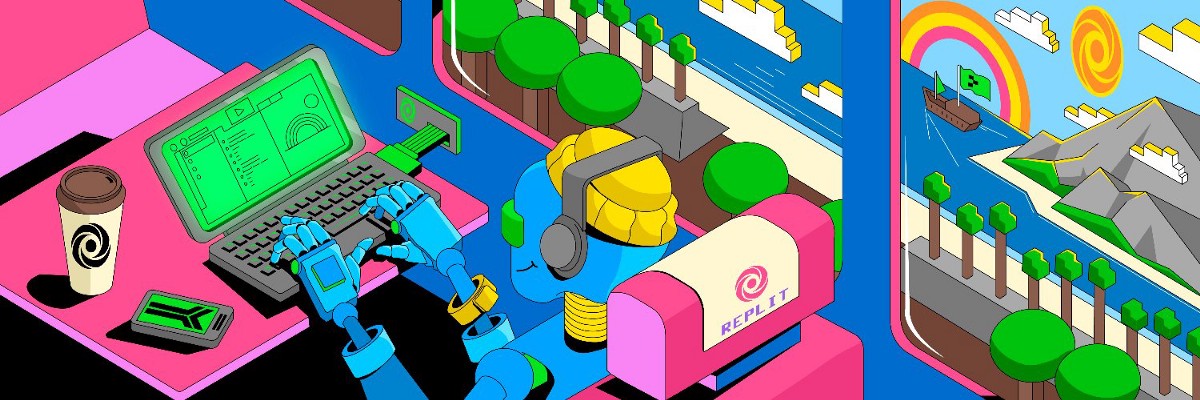Why We Invested in Replit — Again
by Tony Wan (Head of Investor Content) and Wayee Chu (General Partner)
Often the most powerful educational tools are those that blur the lines between learning and building. They unlock our imagination and enable us to create. They connect us to other ideas and builders, and become the bedrock of new communities.
As education investors, we believe in empowering all learners to build the future. And as cultural and technological shifts like web3 accelerate faster than ever, one company has been opening opportunities for everyone to shape what the new digital age will look like.
Since 2016, Replit has been making ripples across the web. What started as a no-setup, hassle-free coding platform has since amassed over 10 million users who have built over 20 million apps and websites. It marries simplicity — anyone can start coding and building immediately — with powerful and versatile features that let them deploy sophisticated programs. Many of its users are kids (some as young as 8) who have built everything from battleship games to chatbots, calculators and apps to help with their homework.
What is so unique about Replit is the community of learners who have come together to engage and make meaningful connections around code. Passionate developer communities have emerged on Discord, Reddit and other social media platforms where they showcase their work. These networks are testament to the social effects that the best education companies create. In our portfolio, we see this with Desmos, where students share art created with its graphing calculator. On Wall Street, we see this in Roblox, the $65-billion publicly traded company that lets kids build, play and earn from the games they build.
Yes, we are incredibly bullish on Replit — not just for what it has already accomplished, but for where it’s going next: to unleash the potential of next-gen coders and give them a chance to be part of the next technology revolution. Replit’s mission is to bring the next billion software creators online by building the world’s most ubiquitous programming environment. We first invested in the company in 2016, and we’re excited to be part of Replit’s $80 million Series B round.
Packy McCormick, who writes the popular Not Boring newsletter, chronicled Replit CEO Amjad Masad’s journey here, punctuated with a bold bet:
Calling it now: @replit will be a $100B company.
More importantly, the billion people who start coding on Replit will make multiples of that online.
Today, @amasad & Replit are announcing an $80M Series B led by @Mazzeo at Coatue at an $800M valuation.https://t.co/RjE1fz5hp3
— Packy McCormick (@packyM) December 9, 2021
Coding Superpowers
Despite the ubiquity of technology in our lives, only a small fraction of people can build software. Ongoing efforts like making computer science education part of the curriculum are an encouraging step to moving the needle. Yet learning how to code remains difficult, often for reasons that have nothing to do with learning how to program. (Try setting up a local coding environment, for example. Printing “Hello World!” shouldn’t be so hard!)
Already, Replit has been making inroads into schools, offering a ready-to-go, browser-based learning environment that works on all platforms (Chromebooks and iPads) without the need for initial setup and constant updates. Its Teams for Education product weaves in curriculum, assignments and auto-grading into its coding sandbox. Teachers and students collaborate in real time — much like they do in Google Docs, and just as professionals do at work.
Much of the magic, though, happens outside of class. Angela Jumper, who teaches computer science to high schoolers at Granbury Independent School District in Texas, says it’s common for students to continue playing the games they built in class after school and start new projects. “My whole class is built on games,” says Jumper, “and to see them continue building after school and having fun — that’s what gets them excited.”
By putting the learners in the driver’s seat, Replit empowers them to build on their own and support one another — and their teachers — along the way. The company has recently expanded its educational toolkit with a new programming environment, Kaboom, for kids to build games, and a feature that lets users highlight code and get an explanation for what it does.
Preparing Tomorrow’s Web Builders, Today
There is tremendous buzz about web3, the next evolution of the internet that is decentralized and distributed. Our colleague Jomayra Herrera has penned a detailed piece on some exciting applications to date and the potential to expand education and economic mobility.
As you read this, people are laying the groundwork for web3. Now, more than ever, coding is a superpower that will allow users to not only build this new internet, but also own a piece of it and share in the wealth that the web brings. Already Replit has added Solidity support for web3 development and will continue adding new tools and features for creators.
The future of learning and building is here. Breaking down barriers to computing and preparing the next generation of creators go hand in hand, and Replit will be the epicenter of learning and community that ushers in the new web. If you want to be a part of helping future generations of coders build the next internet, check out these open roles!



